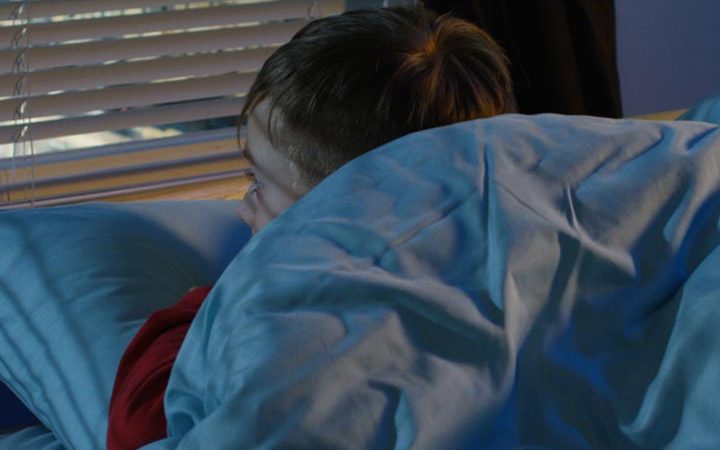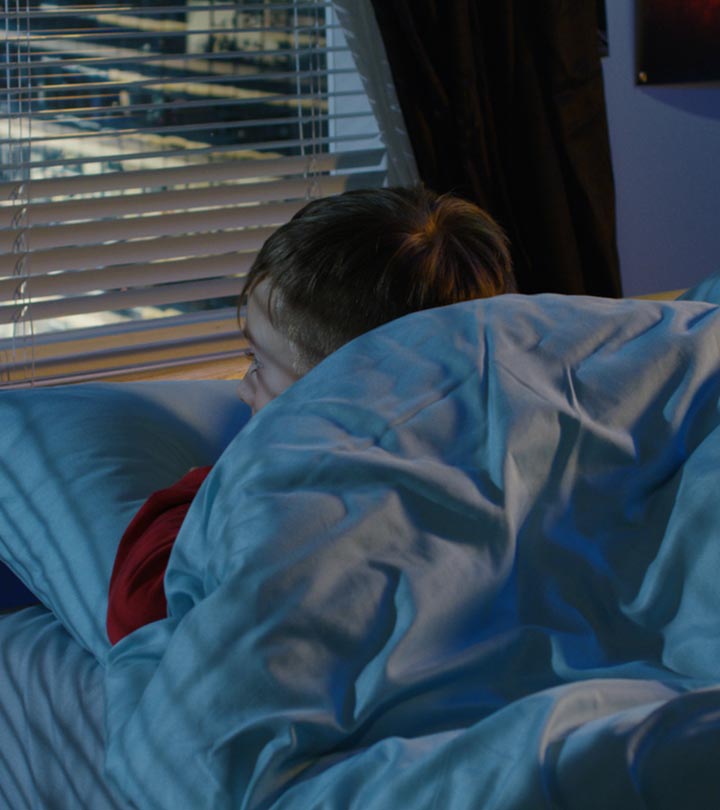Insomnia is a term used to describe a sleep disorder in which a person finds it difficult to fall and stay asleep. Childhood insomnia may develop during infancy and, in some cases, may continue through adolescence. Children with insomnia have persistent trouble falling asleep, lack restorative sleep, or wake up too early and may not go back to sleep.
Insomnia in children may continue for a short term (acute), which lasts for a few days to weeks, or long term (persistent or chronic), lasting for months or even longer (1). Read on to learn about the causes, diagnosis, complications, and remedies for insomnia in children.
Causes Of Insomnia In Children
Insomnia can be a primary condition or may be a symptom of a medical condition. Below are some reasons that may contribute to the development of childhood insomnia (2).
- Mental health disorders or emotional stress: Children under stressful situations at home or school may struggle with sleep. Additionally, existing mental disorders, such as anxiety or depression, may make children more susceptible to sleep disorders such as insomnia.
- Side effects of medications: Certain drugs, such as steroids and antidepressants, may cause changes in a child’s sleeping pattern.
- Sleep time behaviors or associations: Children who are used to too much screen time, sleeping with a parent, and not spending quiet time before bedtime may have issues falling asleep.
- Environmental factors: A peaceful ambiance is necessary for a nice, uninterrupted sleep. Your child may not be able to sleep in noisy or hot environments.
- Caffeine intake: Caffeinated drinks, such as sodas, colas, coffee, and energy drinks, may interfere with sleeping patterns and keep your child awake. Hence, you may avoid giving such drinks to your children.
- Other medical conditions: Certain medical conditions, such as obstructive sleep apnea, restless leg syndrome, ADHD, and infections, may increase the risk of a child developing insomnia.
Symptoms Of Insomnia In Children
Other than sleeplessness, some common signs of insomnia in children may include:
- Fatigue, constant tiredness
- Refusing to sleep or struggling to fall asleep
- Waking up frequently at night, unable to return to sleep
- Day-time sleepiness, taking a nap, or falling asleep in school
- Inability to focus on academic tasks, family relationships, and social interactions
- Being cranky or frequently emotional
- Lack of motivation and inability to make decisions
If your child is experiencing any of these signs and has a poor sleep routine, speak to your child’s doctor.
Complications Of Insomnia In Children
Chronic childhood insomnia and inadequate sleep may increase the risk of the following problems in children (3) (4) (5).
- Psychiatric disorders such as anxiety and depression
- Increased stress levels and emotional problems
- Poor concentration, memory, and academic performance
- Obesity, blood pressure disorders, and higher risks of cardiovascular diseases in the future
Diagnosis Of Insomnia In Children
There is no specific lab test to diagnose childhood insomnia. A pediatrician may use the following techniques to determine the presence of insomnia (6).
- Evaluate a child’s sleep pattern: You may maintain a sleep diary or log of your child’s sleep schedule, which can help the doctor track any sleep-related irregularities.
- Study of a child’s medical history: A doctor may ask for your child’s medical history to check for signs of other underlying medical, developmental, or psychological issues.
- Overnight study: In a few cases, the doctor may suggest overnight assessment of your child’s sleep patterns if they suspect any other conditions such as sleep apnea.
Treatment For Insomnia In Children
Short-term insomnia mostly gets better at home with no treatment. Chronic insomnia may require treatment suggested by a doctor. The doctor may recommend the following interventions, depending on the underlying cause of insomnia and the child’s age.
- Sleep routine modification: It includes creating a plan to develop positive sleep-related activities, such as having a bedtime routine and no screen time before bedtime. You must also establish fixed sleep routines, including naps, to establish healthy circadian rhythms (6).
- Cognitive behavioral therapy for insomnia (CBT-I): This is a structured therapy for insomnia that relies on identifying thoughts and behaviors that are harming sleep patterns and replacing them with those that promote sleep (7).
- Medications: Medication therapy is usually the last line of treatment as most drugs have side effects and are not approved for use in children. You must never give over-the-counter sleep medicines to a child and administer them only as per a doctor’s prescription. A doctor may recommend medications only when other therapies show no positive results. Melatonin is a common medication prescribed for insomnia in children.
Tips To Cope With Insomnia In Children
Children’s sleep issues can often be manageable at home by following a few simple strategies (5) (8).
- Set up a routine and sleep hygiene: Children mostly have sleep problems due to a disturbed sleep pattern. Hence, having a fixed sleep routine may solve most sleep problems.
- Have adequate hours of sleep: The total hours of sleep in a day (24 hours) include naps. Therefore, integrate napping in the child’s sleep routine. You may read about the number of daily hours of sleep needed by a child for their age here.
- Maintain the right room environment: Make sure to maintain cool temperatures, minimum sound disturbances, and proper darkness (also promotes healthy melatonin levels) to create a suitable sleep environment.
- Try relaxation techniques: You may encourage your child to follow a relaxation routine, such as meditation and breathing exercises, before bedtime.
- Avoid screen time: Ensure your child does not have screen time, such as watching cartoons, before bedtime. Screen time may keep their mind excited, making it difficult for them to relax to sleep. Limit screen time and social media use in children at least an hour before bedtime (9).
- Have warm baths: A warm, soothing bath before bedtime may relax a few children, making it easier for them to fall asleep.
- Try smells and fragrances: Mild, calming scents of essential oils may have sleep-inducing effects on some children. You may try using them. However, do not force it on a child if they dislike a smell.
- Check eating before sleeping: Ensure that your child is neither hungry nor eating heavily before going to bed as it may cause sleep disturbances.
- Avoid caffeinated drinks: Caffeine is linked to deceased sleep durations and difficulty in falling asleep (10). Hence, avoid serving caffeinated drinks to children.
- Promote a healthy lifestyle: A balanced diet and a regular exercise routine might be beneficial in promoting good sleep habits in some children.
A good sleep makes a happy and healthy child. Most cases of childhood insomnia are acute and may resolve on their own with a few interventions at home. Speak to your child, check if something is bothering them, and try intervening to solve the issue. If home interventions do not work or insomnia interferes with the child’s health, consult a doctor to avoid long-term complications.
References:
MomJunction’s articles are written after analyzing the research works of expert authors and institutions. Our references consist of resources established by authorities in their respective fields. You can learn more about the authenticity of the information we present in our editorial policy.
The following two tabs change content below.




































